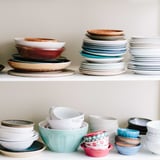
Have you ever wondered what the best practices are for what should and should not be run through the dishwasher? Does it matter if it's silicone or stainless steel? Enamel or bamboo? Years of washing mind-boggling amounts of dishes - in the name of recipe testing, natch - have left us with strong opinions, some of which may even surprise you (see the "run through the dishwasher at your own risk" category). Read through the list, and you'll be armed with the knowledge to keep your dishes sparkling clean and undamaged. Bonus points go to those who forward it to less well-informed spouses and roommates . . .
Definitely Throw In the Dishwasher
- Basic ceramic plates, bowls, and mugs; check the manufacturer's recommendations when in doubt.
- Stainless-steel and Pyrex mixing bowls; on the top rack so that they don't block water flow.
- Pyrex and stoneware baking dishes; check the manufacturer's recommendations when in doubt.
- Plastic and wood-composite cutting boards; check the manufacturer's recommendations when in doubt.
- Kitchen shears, especially if you're using them to break down raw poultry.
- Stainless-steel half-sheet pans, cooling racks, muffin tins, and other metal bakeware.
- Kitchen sponges and scrub brushes; on the top rack only.
- Silicone and metal kitchen utensils.
- Measuring cups and spoons.
- Stainless-steel flatware.
Don't Even Think About Putting in the Dishwasher
- Heirloom, high-end, or particularly delicate china, glassware, and silver - anything you'd cry over breaking.
- Wooden and bamboo cutting boards, tools, and utensils; high heat will warp and even crack wooden cookware.
- Kitchen and steak knives, especially carbon steel; they'll lose their edge faster. (Wooden handles can warp, too.)
- Cast-iron pots and pans; really, soap should never come in contact with cast iron.
- Copper pots and pans; the metal will dent.
- Enameled cast-iron pots and pans; the enamel can chip.
- Pop-top pantry storage containers; the gasket may warp with repeated washings.
Run Through the Dishwasher at Your Own Risk
- Nonstick pots and pans and bakeware; the nonstick finish will depreciate faster.
- Stainless-steel pots and pans; make sure that any stuck-on food is soaked to loosen it up first and that they don't block water flow too much. Handles may loosen over time as well.
- Travel coffee mugs and reusable water bottles; the seal may depreciate faster, but we put these in the dishwasher for convenience's sake. Some are even made to be dishwasher-safe.
- Some insulated beverage cups; check the manufacturer's recommendations when in doubt.
- Serrated/bread knives; this isn't best practice, but their edge is less damaged by dishwasher abuse than other kitchen knives, and these tend to be replaced more often as they're harder to sharpen anyway.
- Wooden chopsticks; perpendicular to the grates that hold things in place on the top rack. They may swell or warp with repeated washings.
- Inexpensive stemware; on the top rack only. Some breakage may happen, but isn't that why you bought it on the cheap?
- Inexpensive wooden spoons and utensils; on the top rack (see inexpensive stemware).
- Inexpensive glass and stoneware vases; on the top rack (see inexpensive stemware).

